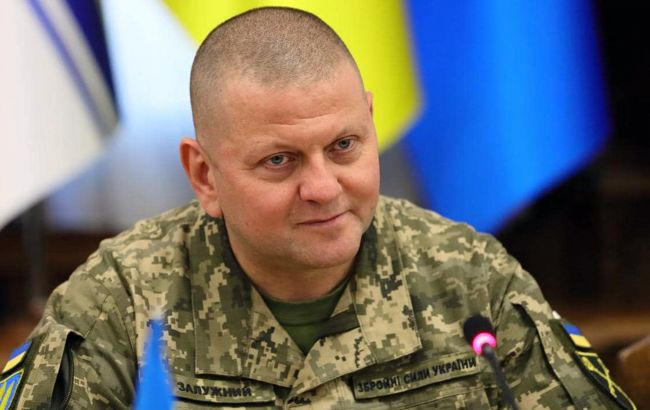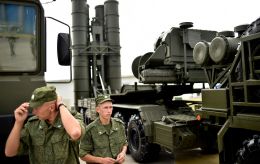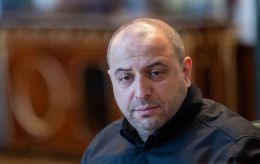Zaluzhnyi: We still need shells, F-16s and patience
 Valerii Zaluzhnyi, Commander in Chief of the Armed Forces of Ukraine (Photo: facebook.com/vzaluznyj)
Valerii Zaluzhnyi, Commander in Chief of the Armed Forces of Ukraine (Photo: facebook.com/vzaluznyj)
Ukraine needs more weapons for a faster counteroffensive, and these resources are needed right now, emphasizes Commander in Chief of the Armed Forces of Ukraine, Valerii Zaluzhnyi, in his interview with The Washington Post.
Ukrainian troops are advancing every day
Zaluzhnyi is disappointed that Ukraine has not yet received Western fighter jets. Although the allies would not dare to launch an offensive without air superiority. Promised F-16s are unlikely to arrive by autumn, and even then, autumn is the best-case scenario.
According to him, Ukrainian forces should be firing the same number of shells as the enemy. However, due to limited resources, the Russians sometimes outnumber them tenfold in artillery fire.
"It pisses me off," Zaluzhnyi responds to criticism that the counteroffensive in the east and south is slower than expected.
This opinion has been publicly expressed by officials and military analysts in the West. The general assures that his forces are advancing every day, even if only by 500 meters.
"It's not a show the whole world is watching and betting on or anything. Every day, every meter is given by blood. Without being fully supplied, these plans are not feasible at all,” he added. “But they are being carried out. Yes, maybe not as fast as the participants in the show, the observers, would like, but that is their problem," he stated.
Hope in allies
Over the past 16 months, the 49-year-old Zaluzhnyi has been tasked with leading Ukrainian forces against a larger and better-equipped Russian army that occupies about 20% of Ukraine's territory. And he is succeeding, partly through NATO tactics training and a departure from overly centralized "Soviet" command structures.
Every day, he is troubled by questions: when will Western partners provide the necessary weapons, more ammunition, and F-16s? And how can he expect to succeed without them?
Zaluzhnyi shares his concerns with his American colleague Mark Milley several times a week, sometimes for hours. He admires Milley and considers him a friend.
"He shares them absolutely. And I think he can help me get rid of those worries," Zaluzhnyi noted, adding that in their recent conversation, he mentioned the necessary amount of ammunition per month.
In these conversations, Zaluzhnyi speaks openly about the consequences.
"We have an agreement: 24/7, we’re in touch. So, sometimes I can call up and say, ‘If I don’t get 100,000 shells in a week, 1,000 people will die. Step into my shoes,'" he shared.
At the same time, it is not up to Milley to decide whether Ukraine will receive aircraft.
"It’s just that while that decision is being made, in the obvious situation, a lot of people die every day — a lot. Just because no decision has been made yet," added the Commander-in-Chief.
Although there is an agreement in the West that Ukraine will receive F-16s, the shortage of ammunition creates another problem. In February, NATO Secretary-General Jens Stoltenberg warned that the rate of ammunition expenditure in Ukraine far exceeded production rates. This means that the longer the war lasts, the more scarce the ammunition needed by Zaluzhnyi will become.
Ukraine lost some Leopard 2 tanks
Ukraine received Western tanks, including German-made Leopard 2 tanks, and IFVs before the summer counteroffensive. Russian forces maintain a land corridor in southern Ukraine to the occupied Crimea, where they have several military facilities. Severing this corridor would deal a serious blow to Moscow's logistics.
These tanks and combat vehicles made their debut on the battlefield at the beginning of the month. Zaluzhnyi acknowledges that some of them have already been destroyed. But according to him, the Leopard tanks came to Ukraine for the war, not parades or photo sessions with politicians and celebrities.
"A Leopard on the battlefield is not a Leopard but a target," Zaluzhnyi added.
According to analysts, Ukraine has not yet started the main counteroffensive. Not all specially trained forces have been sent to the front lines. And those that are there seem to be finding weak spots in Russia's defense. The Ukrainian side claims that approximately 130 square kilometers of territory were liberated in June.
Air Force needs Western aviation
At the same time, Zaluzhnyi draws attention to NATO's doctrine. According to him, it is similar to the Russian doctrine and emphasizes air superiority before initiating ground operations.
"And Ukraine, moving to offensive operations, should follow which doctrine? NATO's? The Russian Federation's? Or is that none of your business? ‘You have your own doctrine. You have tanks, you have some cannons, you have some [fighting vehicles]. You can do it.’ What is that?" the dissatisfied general questioned.
At his command post, he has a screen that shows him everything that is happening in the air at any moment - NATO aircraft near Ukraine's western borders, Ukrainian military planes, and Russian planes on the eastern borders.
"Let’s just say the number of aircraft that are on duty near our western borders is twice as much as the number of Russian aircraft devastating our positions. Why can’t we take at least a third of it from there and move it here?" Zaluzhnyi asks.
Modern Russian Su-35s have far more advanced radars and missile capabilities, making it impossible for Ukrainian aircraft to compete. As a result, ground forces become easy targets.
Nobody is saying that tomorrow we should rearm and get 120 planes,” Zaluzhnyi said. “Why? I do not need 120 planes. I’m not going to threaten the whole world. A very limited number would be enough. But they are needed. Because there is no other way. Because the enemy is using a different generation of aviation. It’s like we’d go on the offensive with bows and arrows now, and everyone would say, ‘Are you crazy?'" said the general.
Prigozhin's coup did not affect the counteroffensive
If there are any speculations that the Ukrainian counteroffensive received an impulse when the founder of the Wagner PMC, Yevgeny Prigozhin, instigated a coup over the weekend, Zaluzhnyi is not convinced of it.
According to him, the Wagner soldiers left the front line a month ago after capturing Bakhmut. And with the start of the military coup in Russia, there have been no noticeable changes on the battlefield.
"We didn't feel that their defense got weaker somewhere or anything," he said.
Russian President Vladimir Putin stated that Wagner fighters who do not wish to stay in Russia or sign contracts with the Ministry of Defense may join Prigozhin in Belarus. Therefore, Zaluzhnyi may have to consider a new threat from the north.
"I have a lot of fears, and Wagner is among them. And they’re not the only ones. If we start talking about it now, my head will spin. Our task is to prepare for the worst and most possible scenarios. And we will try to minimize the possible consequences of what could be," he added.
Response to Putin's nuclear threats
One of the worst scenarios is the deployment of nuclear weapons by Vladimir Putin. Last week, Zelenskyy warned that Russian forces are preparing a terrorist attack with a release of radiation at the captured Zaporizhzhia nuclear power plant.
Can this threat deter Zaluzhnyi from attempting to regain control of the station during the offensive?
"It doesn't stop me at all. We are doing our job. All these signals come from outside for some reason: ‘Be afraid of a nuclear strike.’ Well, should we give up?" Zaluzhnyi said.

